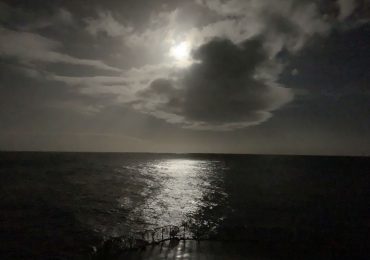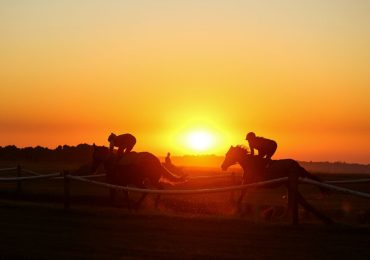The JRB presents new short fiction by Werner Pretorius.
~~~
Die Voorkamer
We sat up in the big front room with Ouma. She called it die voorkamer. It was a lounge situated at the very front of the large old house, with a big window that looked out over the long driveway to the front gate. Sandra closed the curtains once the sun was down and turned on the standing lamp in the corner. Every time headlamps flashed, like eerie spectres, across the curtains Ouma’s head would shoot up and follow their path. ‘Hier’s hy nou,’ she would say. And I would shake my head without shaking my head. I had once explained that there was a three-way stop about fifty metres from the front gate and when anyone turned left onto Prinsloo Street their headlamps would trace an arc across the front window, but Sandra had shot me such a look of admonishment that I’d never again dared raise the matter.
Neef arrived at around seven-thirty, his Land Rover Defender’s headlamps drawing a ‘Hier’s hy nou,’ from Ouma as his shock absorbers squeaked and juddered over the rutted driveway’s bumps. I thought often about laying down a cement or brick driveway, as the indentations got worse with every season’s heavy rainfall. No matter how carefully I tried to explain that it was in everyone’s best interest as it would raise the property’s value and would fetch a better price if they chose to sell once Ouma had moved along the subject remained an impenetrable wall. I stood with Neef one Sunday on the driveway and explained how easy it was to do while he smoked his vape. He agreed with everything I said in a non-committal, off-hand way and no more was said about it.
When the front gate moaned on its rusted hinges at ten to eight and the dogs, Fielies and Quinton, filled the yard with a cacophony of excited barking we knew Basie had arrived. He was on foot since he lived only a couple of blocks away on De la Rey Avenue. He patted the dogs, played with them for a bit and topped up their water bowls from the outside tap and their food from the big bag of Bobtail that was kept in the garage before he came inside.
‘Oh, everyone’s here,’ he said, exchanging a look with Sandra and Neef I’d seen enough times to know it communicated, tonight’s a serious one.
‘Won’t you brew us a pot of coffee?’ Sandra said to Basie before he could sit down.
‘I’ll get it,’ I said. ‘You guys sit, catch up.’
I knew they spoke English for my benefit. It was both a kind of courtesy thing that came from the stern adherence to manners they’d been brought up with, and, I suspect, Sandra had sat them down years ago when she broke the news that things were getting serious between her and the Englishman and said she’d appreciate some compliance on the language of choice in my presence. It was meant to make me feel welcome and part of the family, but it often had the opposite effect. For Neef this was no problem as he did most of his business over the phone in English. But Basie struggled. Basie was fluent in Northern Sotho, spoke it all day with the workers on the farm where he was foreman, and I’d heard him speak nonstop at bigger family gatherings telling long and convoluted stories in his native Afrikaans. But English twisted his tongue and he never uttered more than short sentences in my presence. Brewing a pot of coffee and taking my time about it would give them an opportunity to talk and lay the groundwork for how to get out of this evening without us all needing to be here until two in the morning.
The kitchen was at the back of the house. I made my way along the carpeted hallway, passing two bedrooms on my left and a bathroom and laundry on my right. The house was dark. The glow from the standing lamp in the lounge receded behind me. Ouma, very frugal with electricity, switched a light on when she entered a room and flicked it off again when she left. Since Sandra and I handled all her paperwork we were often astounded when the bills were due by how little she used.
I stood in the kitchen for a while, in the dark, looking out over the back yard at Oupa’s vegetable garden. He planted beetroots, onions, potatoes, carrots and parsley in neat, well-maintained rows. It was his project and pride as he lived out his days on his Railway pension. Since he passed away, Basie’s been tending the garden on weekends. Basie had been almost zealous about it for the first few months, as if the garden was the memory of the old man. But over time, as the immediacy of Oupa’s sudden passing faded, Basie’s tending lapsed. Every weekend became every other weekend became once a month became once every two months. Onions and carrots were the only things still growing in that soil last time I’d wandered out there on a daytime weekend visit. Ouma still watered the garden and the peach and apricot trees behind the garden that were pushing up the prefab wall with their roots.
We tried to visit once a week, would mostly come through on Sunday afternoons and sit in die voorkamer with Ouma as the sun slanted pleasantly across the cream coloured carpet. If we couldn’t make it on any given weekend Sandra would make sure to phone Ouma in the evening. This method proved highly inadequate as Ouma wouldn’t say more than a sentence or two before she started with, ‘Kind, dis duur om so oor die foon te praat. Ons moet aflui.’ Sandra would reassure her that since she (Sandra) was the one making the phone call it would not show up on Ouma’s account. ‘Ja, maar dan is dit op jou rekening,’ would be the terse reply. ‘Mens gooi nie geld sommer so in die water nie.’
‘I find it fascinating how selective she is with her prudence,’ I said to Sandra one evening as we were getting ready for bed.
‘How do you mean?’ She paused while brushing her hair in the mirror.
‘How spending more than five minutes on the phone is regarded as a mortal sin, while nothing is ever said about the petrol we use driving out there twice, sometimes three times a week.’
Sandra thought for a moment. ‘I think there’s always been this waste-not attitude with their generation. They lived through the war years and they grew up on farms where there wasn’t the kind of abundance we’re used to now.’
‘I guess petrol is just a blind spot for her?’
‘Oupa used to deal with things like that. Don’t think it even occurs to her.’
It was no big deal to me. The fifty-odd kilometres from our house in the eastern suburbs of Pretoria to Prinsloo Street in Bonkhorstspruit was negligible all in all, as in, it was well within our budgetary constraints, and was never up for discussion as I knew how important Ouma’s well-being was to Sandra. What gnawed at me was the impracticality of it all. Having to drive through on a Wednesday night after a tough day at work or having to cancel dinner plans at the last minute on a Friday evening because Ouma was having an episode was beginning to stretch my patience, no matter how much sympathy I had for the situation.
Basie lived by himself in a tiny townhouse complex around the corner from Ouma’s and the deal was, since he wasn’t in a position to contribute financially, that he would be the man on the ground and pop over to check on Ouma every day. But, as foreman on a farm, his hours were often irregular. And as a bachelor in his late twenties he was on the prowl. As time passed we were picking up more and more of the slack as he was always going on a date. He’d downloaded some app and was on there more than I thought was healthy.
‘Surely he must have been out with every woman in Bronkhorstspruit by now,’ I said one Wednesday out somewhere on the N4 after I’d been coerced out of a hot bath.
Neef was happy to contribute money, but since he lived in Sandton there was a mutual understanding that the hundred-odd kilometres it took for him to get to Bronkhorstspruit was disruptive. He endeavoured to come through on special occasions and maybe one weekend a month. This never really materialised, as Neef’s wife Jacqui had little time for his extended family, regarded them as plebian baggage Neef carried that she felt no obligation to engage with beyond funerals or weddings.
On a Sunday visit about three months after Oupa passed away Sandra and I brought over some brochures, fliers and information leaflets for old age homes. We’d focused on elegant ones in the generally affluent eastern suburbs of Pretoria, so that she would be nearer to us and so the move wouldn’t feel like a downgrade. Sandra and I had lay in bed, discussing how we could frame it as a well-earned comfort at the back end of a life lived. No more upkeep on a house and yard, no more dogs to worry about. A full staff on site to look after your every need. She glanced at the brochures for all of five seconds, to discern what they were, and then put them on the round table next to her easy chair in die voorkamer. Basie said he found them in the stainless steel pedal bin in the kitchen the next morning when he came round to feed the dogs.
Might have been too soon, we concluded. We waited three months and then booked a visit to Huis HJ Piek in Nieuw Muckleneuk. They had open Sundays where prospective residents could join for lunch in die eetsaal. She had a meet and greet with current residents and was shown around the facilities and grounds. We hoped that whatever anxieties she had about the big scary thing that was a Retirement Home would be dispelled by actually meeting the community and experiencing the ambience. According to the matron she’d been pleasant and agreeable during the meal and the subsequent tour. When we got her home that evening and she was comfortably installed in her plush chair with a cup of coffee, she said, ‘Nee, julle kry my nie hier uit nie.’
Neef’s opinion was that Ouma was still quite capable despite her age, and that a better approach might be to explain that the retirement home offer was on the table, but that it was up to Ouma to tell us when she was ready.
I read it as a shrugging off of responsibility, coming from the guy who visited Ouma strictly at his convenience. On top of that I wasn’t convinced, as this reasoning had been applied to Oupa’s driving as well. He’ll know when he’s no longer capable, had been the general consensus then.
The accident hadn’t been Oupa’s fault, as far as we could make out from the police reports. Said reports included an aerial view drawing of the accident. A taxi ran the stop street on the corner of Prinsloo and Church, T-boned Oupa’s 1980 model Mercedes 250E, hit it square on the driver’s door. The resultant ricochet meant the car came to rest against a freight truck waiting to turn right at the four-way stop. The taxi had been going fast, meaning Oupa was most likely dead on impact.
There was no real argument to be made that Oupa should no longer have been driving, so I didn’t; but I couldn’t help but feel that a younger driver might have been alert to the fact that the speeding taxi had no intention of stopping. I often wondered whether the taxi driver flashed his lights at the last moment and if that’s the last thing Oupa saw. No way of knowing since the driver also died on impact, and the taxi was empty. He’d probably been racing back to the depot after a long shift, his mind fixed on getting home.
From Ouma’s perspective, Oupa had set out to get milk and sugar for their bedtime coffee and never returned. The man had never been sick a day in his life. He could have lived forever for all we knew; had outlived all his children, to the point that their old age concerns became that of the grandchildren. And then one innocuous moment of inattention, probably in a hurry to get the menial task done, and that was it.
I returned to die voorkamer, balancing five steaming mugs of coffee as well as a ceramic sugar bowl and milk jug on a serving tray. I observed the family tradition of holding the tray for each person so that they could add their sugar and milk to taste while remaining seated. Ouma was served last as the ritual also dictated that guests get served first.
‘Het jy daai kombuis lig afgesit?’ Ouma asked when I got to her.
‘Sal nou, Ouma,’ I said. ‘My hande was vol.’
I returned to the back of the house to switch off the kitchen light before I sat down with my coffee.
Tonight was the one year anniversary of Oupa’s death. We held a silent vigil, the occasional sip or slurp the only sounds. Now and again a roof beam would crack as it contracted in the cold of the night, and I could make out the ticking of the clock on the wall in the passageway.
Once all the mugs were empty I went round with the tray to collect them. I returned them to the kitchen in the dark, not having a hand free to switch on the light. I put the tray next to the sink and ran some water to rinse the mugs, when a bright light flashed across the kitchen window. I stood back from the sink, aghast. Wind, like a breath or a sigh, sounded from the gap under the back door. The dogs started barking in the yard. They ran to the vegetable garden, where they stood up on their hind legs by the gate that was there to keep them out.
The key to the back door was kept on a nail in the wall right next to it. I unlocked and went out. And there was Oupa, in the vegetable garden, reaching over the little gate to stroke the dogs. He bunched their cheeks and shook their heads in his hands, producing a playful growl first from Fielies and then from Quinton, their tails wagging with excitement all the while. Then he kissed them each on the forehead, looked up at me, winked, and was gone.
The dogs barked a couple more times and then returned to their kennels and blankets, satisfied.
I locked, walked back to die voorkamer on legs that felt like they belonged to someone else. When I arrived Sandra asked, ‘What was that?’
‘Hy’t net die honde kom groet,’ Ouma answered before I could. ‘Toe, laat julle skuur. Ek is ’n oumens. Ek moet in die bed klim, kan nie heel aand hier met julle opgeskeep sit nie.’
In the car, on the way home, Sandra asked me what happened.
I explained as best I could, sounding strange to my own ears.
She nodded and sat quietly for a while, before she said, ‘It was odd. Usually we have to extricate ourselves by making excuses of long work days ahead. And tonight she kicked us out.’
Basie phoned the next morning with the news that Ouma had passed during the night. He found her tucked up in bed, a contented smile on her face. He phoned the morgue to collect the body and we started making arrangements for the funeral. Basie moved into the house on Prinsloo Street to look after the dogs and eventually sold his townhouse on De la Rey Avenue. I drove out there on a couple of weekends and helped him lay a brick driveway.
And to this day, whenever I see lights flash across a window at night, I find myself mouthing ‘Hier’s hy nou.’
~~~
- Werner Pretorius holds degrees in Publishing and English from the University of Pretoria and a Masters in Creative Writing from the University of Cape Town. His stories and short fiction have appeared in Something Wicked Magazine, Jungle Jim, Prufrock Magazine and in Die Laughing as part of the 2016 Short Sharp Stories competition. He lives and works in Cape Town.





